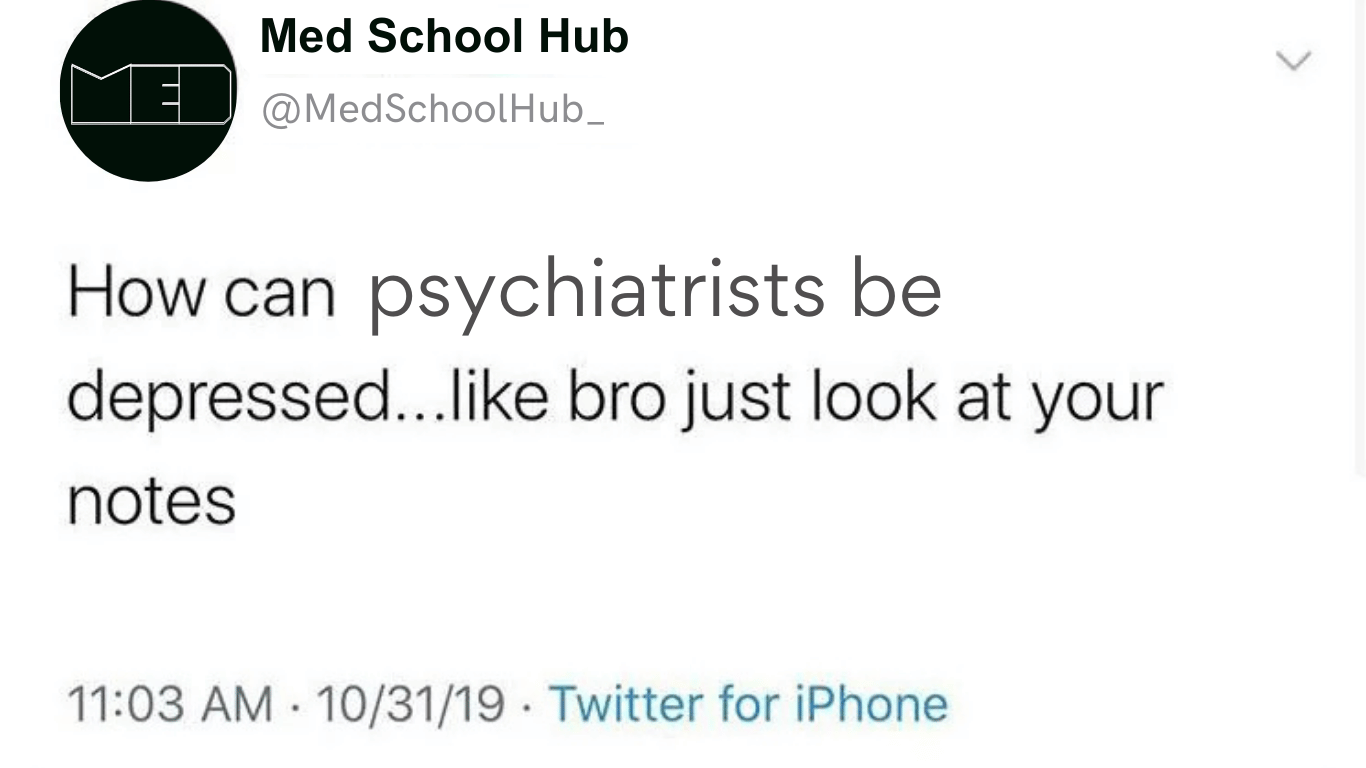Psychiatrists dedicate their lives to helping others navigate mental health challenges. But here’s the twist—many of them are struggling too. It’s a common stereotype among medical students that the psychiatrist are all having some psych illness themselves. But is it just a stereotype, or is it based? Research reveals that psychiatrists experience higher rates of depression, anxiety, and burnout than other doctors and even the general population. Why is this happening? And what can be done about it?
How Common Are Psychiatric Disorders Among Psychiatrists?
Depression, Anxiety, and Trauma—The Unseen Burden
Let’s start with the numbers. Major depressive disorder (MDD) affects 30.1% of psychiatrists—significantly higher than the 24.9% rate seen in the general population. Female psychiatrists are particularly vulnerable, being 71% more likely to receive a mood disorder diagnosis than their male colleagues.
Anxiety is another major issue, with 29% of psychiatrists experiencing generalized anxiety disorder (GAD) or post-traumatic stress disorder (PTSD). The nature of their work makes things worse—32% report patient-related traumatic incidents (like threats or stalking) that meet PTSD criteria. Compare that to the 9% of doctors in procedural fields, and the gap is staggering!
Substance Use and Burnout—Coping in Unhealthy Ways
When stress levels soar, some psychiatrists turn to substances to cope. Their rates of substance use disorders (SUDs) are 2.3 times higher than other physicians. Alcohol dependence affects 8.4%, and 5.1% misuse prescription stimulants. Burnout is another massive issue, with 42% of psychiatrists affected—14 percentage points higher than the physician average.
Why? Here are some major culprits:
- Paperwork Overload – 68% of psychiatrists spend at least half their work hours buried in electronic health records.
- Moral Injury – 44% feel distressed when insurance restrictions limit patient care.
- Patient Violence – 28% have been physically assaulted by patients.
Not to traumatize you, but one psychiatrist is at a significantly higher risk of patient violence than other specialists. In one incident, a woman was receiving electroconvulsive therapy for severe depression during her pregnancy. Other complications during delivery and period of pregnancy had resulted in her demise. Her husband was told by someone that the electroconvulsive therapy was the cause. He visited the psychiatrist’s clinic disguised as an unsuspecting patient. He sneaked in a kitchen knife. Then, he proceeded to carve up his face. Basically, he gave him an impromptu facial reconstruction. This left the psychiatrist incapable of eating solid food from the mouth for the rest of his life.
These pressures take a toll. A 2025 meta-analysis found that burned-out psychiatrists have a 19% higher risk of dying from cardiovascular disease. They also engage in high-risk behaviours.
The Ethical Dilemma: Can Struggling Psychiatrists Still Treat Patients?
Impairment vs. Competency—Where’s the Line?
Psychiatrists are bound by ethical guidelines requiring them to self-monitor for mental health conditions that could impair judgment. But defining “impairment” is tricky.
- Mild-to-moderate depression slows diagnostic accuracy by 12% but doesn’t significantly affect prescription safety.
- Anxiety reduces working memory by 23%, leading to more prescription errors.
- Active substance use? That’s a red flag—licensing boards typically require immediate suspension.
The Culture of Silence—Why Psychiatrists Avoid Seeking Help
Here’s the irony: The very people trained to treat mental illness hesitate to seek help themselves. Only 9% of psychiatrists disclose mental health diagnoses to their employers, largely because:
- Fear of Discrimination – 63% worry about workplace stigma.
- Licensure Concerns – 48% fear losing their ability to practice.
- Increased Scrutiny – 71% say colleagues judge their decisions more harshly after disclosure.
Systemic barriers make things even harder. A shocking 74% of residency programs lack confidential mental health services. Additionally, 83% of psychiatrists fear that seeking inpatient care would trigger mandatory reporting to medical boards. Instead of getting help, many self-medicate—28% prescribe themselves psychiatric medications rather than consulting a professional.
Fixing the System: How Can We Support Psychiatrist Mental Health?
Change is needed. To safeguard both psychiatrists and their patients, healthcare institutions must take action. Here are some solutions:
- Anonymous Mental Health Screenings – Psychiatrists should undergo regular check-ins with third-party evaluators.
- Objective Impairment Testing – fMRI and EEG-based assessments could provide unbiased evaluations of clinical competency.
- Safe Harbor Policies – Self-reporting mental health conditions shouldn’t lead to automatic licensure penalties.
- AI-Powered Documentation – Reducing administrative burden by 40% through AI-driven recordkeeping.
- Resilience Training – Teaching psychiatry residents skills like dialectical behavior therapy (DBT) to manage stress effectively.
Final Thoughts—Breaking the Stigma
Psychiatrists are not immune to mental health struggles. In fact, their profession places them at greater risk. But the current system pushes them to suffer in silence rather than seek help. By reforming workplace policies, reducing stigma, and ensuring access to confidential care, we can protect both psychiatrists and their patients.
References
https://pmc.ncbi.nlm.nih.gov/articles/PMC5363427/



Leave a Reply